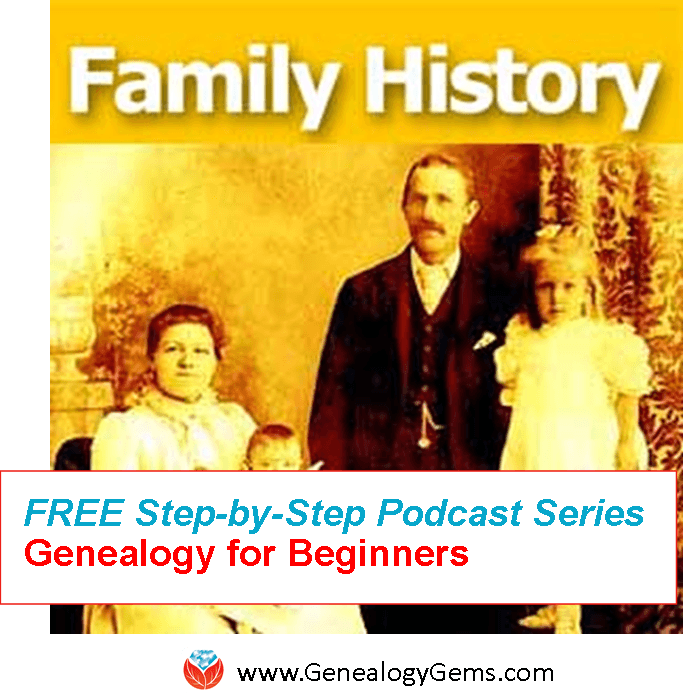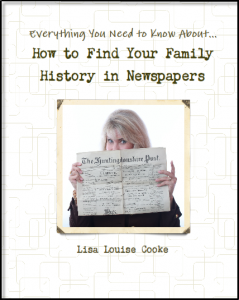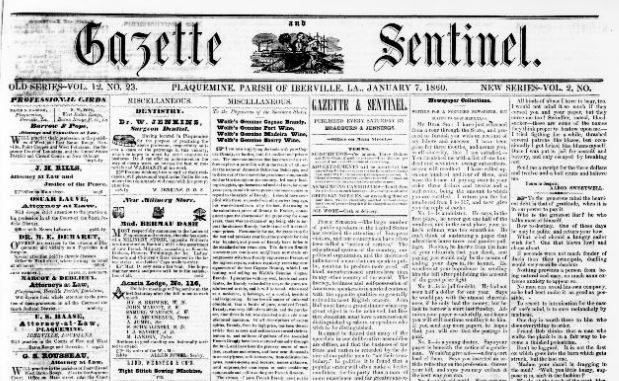by Lisa Cooke | Apr 15, 2014 | 01 What's New, Beginner, Family History Podcast, Newspaper

Listen to the Family History: Genealogy Made Easy podcast by Lisa Louise Cooke. It’s a great series for learning the research ropes and well as refreshing your skills.
Family History: Genealogy Made Easy
with Lisa Louise Cooke
Republished April 15, 2014
[display_podcast]
Download the Show Notes for this Episode
Welcome to this step-by-step series for beginning genealogists—and more experienced ones who want to brush up or learn something new. I first ran this series in 2008-09. So many people have asked about it, I’m bringing it back in weekly segments.
Episode 27: Find Your Family History in Newspapers, Part 1
Newspapers offer such a unique perspective on history in general, and our ancestors specifically. You can find everything from birth, marriage and death announcements, to school and club event, crime stories, land transactions, sports activities and just about any other activity that your ancestors were part of that made the news. So let’s get started and “Read all about it!”
In this episode, you’ll hear from Jane Knowles Lindsey at the California Genealogical Society. She is currently the president there and often teaches on this subject. Our conversation on newspaper research continues in next week’s episode!
Here are some take-away thoughts from this episode, along with some updates:
- Determine which newspapers existed for your ancestor’s hometown and time period. Look for ethnic and neighborhood papers, too. The most comprehensive U.S. newspaper directory is at Chronicling America. This site does let you search by language, ethnic background, labor group and more.
- Look for these newspapers at digitized newspaper sites, starting with the free ones. In the U.S., this means starting with Chronicling America and state digital newspaper project sites (search on the state name and “digital newspapers”). These sites came out of the government digitizing program mentioned in the show.
- Digitized newspaper searching is done with OCR (optical character recognition), which doesn’t pick up everything in tough-to-read historical print. Try searching with different spellings, a first name in a particular timeframe, or other people or terms that may have been mentioned.
- Ancestry has put lots of newspapers on their website—but not everything, and for only limited time periods. Notice what time period is covered for a specific newspaper. Ancestry has since launched Newspapers.com.
- If you’ve found the name of a newspaper that probably covered your family, but you haven’t found it digitized, search the name of the newspaper in your favorite web browsers. Most newspapers are on microfilm somewhere and web directories will likely list holdings. Also, some newspapers have also been indexed on USGenWeb or other sites.
- State archives and libraries are often a great resource for newspapers. Local libraries may have unique clippings files or scrapbooks.
- Several websites and databases now focus on obituary content. You can target a search for these.

Available at http://genealogygems.com
I loved this topic so much I ended up writing a book on it! How to Find Your Family History in Newspapers walks you through the process of finding and researching old newspapers. You’ll find step-by-step instructions, worksheets and checklists, tons of free online resources, websites worth paying for, location-based newspaper websites and a case study that shows you how it’s done.
More Newspaper Links
Some of the digital newspaper collections mentioned in the episode are available by library subscription, like The Early American Newspapers collection the and 19th century Newspaper Collection from The Gale Group. Check with your local library.
Fold3.com (formerly Footnote.com)
GenealogyBank
Godfrey Memorial Library
New England Historic Genealogical Society (by subscription only)
Newspapers.com
Small Town Papers
USGenWeb
by Lisa Cooke | Dec 2, 2013 | 01 What's New, Conferences
The program for the 2014 National Genealogical Society Conference has been released! The lineup for the Richmond, Virginia event looks fantastic. Here’s the official summary:
“Conference highlights include a choice of more than 175 lectures, given by many nationally known speakers and subject matter experts about a broad array of topics including records for Virginia and its neighboring states; migration into and out of the region; military records; state and federal records; ethnic groups including African Americans, German, Irish, and Ulster Scots; methodology; analysis and problem solving; and the use of technology including genetics, mobile devices, and apps useful in genealogical research.”
I’ll be at NGS 2014 teaching these classes:
- Google Search Strategies for Common Surnames
- Tech Tools that Catapult the Newspaper Research Process into the 20th Century
- Find Living Relatives Like a Private Eye
Looking for my classes? Open the registration brochure (link below) and hit Ctrl+F, then type my last name and hit enter. Hit the up and down arrows to browse the places where my name appears.
Registration opens on December 1, just after Thanksgiving weekend in the U.S.
Why read over the program now? Because like early holiday shoppers, you’ll get the best selection if you’re ready to go when it opens. A number of special events (see the brochure) have limited seating so you’ll want to register as early as possible to ensure your seat. The 16-page downloadable registration brochure addresses logistics as well as the program.
Read more about it on the NGS website, or jump to these helpful URLS:
Guide for 1st-time NGS attendees
Up-to-date hotel info
Conference blog
by Lisa Cooke | Aug 15, 2013 | 01 What's New, Newspaper
Have you already searched for your relatives’ names at Chronicling America, the the Library of Congress’ web collection of digitized American newspapers? Well, search again!
Recently the the Library of Congress added more than 600,000 historic newspaper pages to its enormous collection. According to a press release, these pages include “first-time contributions from Iowa, Michigan, and West Virginia. Other new additions include content from Hawaii, Indiana, Illinois, Kansas, Kentucky, Louisiana, Minnesota, Montana, North Dakota, Oklahoma, Oregon, South Carolina, Tennessee, and Texas.” The site now has over 6.6 million searchable newspaper pages from over 1100 newspaper titles, published in 30 states and Washington, D.C. between 1836 and 1922.
 What are the chances your family will appear on one of those pages? Pretty good, actually. Here’s a list of the kinds of articles they may show up in from my book How to Find Your Family History in Newspapers:
What are the chances your family will appear on one of those pages? Pretty good, actually. Here’s a list of the kinds of articles they may show up in from my book How to Find Your Family History in Newspapers:
- Advertising: classifieds, companies your ancestor worked for or owned, grocery or dry goods stores ads (for historical context), runaway slaves search and reward, ship departures.
- Births & deaths: birth announcements, card of thanks printed by the family, obituary and death notices, “Community Pioneer” article upon passing, funeral notice, reporting of the event that lead to the death, or the funeral.
- Legal notices and public announcements: auctions, bankruptcies, city council meetings, divorce filings, estate sales, executions and punishments, lawsuits, marriage licenses, probate notices tax seizures, sheriff’s sale lists.
- Lists: disaster victims, hotel registrations, juror’s and judicial reporting, letters left in the post office, military lists, newly naturalized citizens, passenger lists (immigrants and travelers), unclaimed mail notices.
- News articles: accidents, fires, etc. featuring your ancestor; front page (for the big picture); industry news (related to occupations); natural disasters in the area; shipping news; social history articles.
- Community and social events like school graduations, honor rolls, sporting and theater events; social news like anniversaries, church events, clubs, engagements, family reunions, visiting relatives, parties, travel, gossip columns, illnesses, weddings and marriage announcements.
Learn more about researching family history with my book, available in both print and e-book format. And don’t forget to keep checking Chronicling America for stories and clues about your ancestors’ lives.
by Lisa Cooke | Apr 5, 2013 | 01 What's New, Newspaper, Research Skills, Technology
Many of us know the fabulous Chronicling America newspaper site. Hosted by the Library of Congress, it catalogs all known U.S. newspapers and provides free access to more than six million digital newspaper pages. Well, this site keeps getting better. Content continues to grow and expand into other languages. And–something I personally love–the site will be easier to use on my iPad and iPhone!

Gazette Sentinel, Plaquemine, LA, Jan 20, 1860, Image from Chronicling America
First, let’s look at growing content: 130 new titles and 800,000 pages are new on the site. New titles include French and Spanish newspapers, like the French-English bilingual paper shown here.
‘We as genealogists can read as it were over our ancestors’ shoulders.’
Historical newspapers give readers a front-page view of American history. Recent additions to the collection echo popular feelings about presidential politics, slavery and westward expansion. We as genealogists can read as it were over our ancestors’ shoulders. Even if we don’t find them mentioned there specifically, we can learn a lot about their lives from newspapers of their day.
As I mentioned, Chronicling America now works better on mobile web devices. Specifically mentioned in a recent press release are “the ability to enlarge a portion of a newspaper page in a tablet or mobile phone device by using a pinch-to-zoom gesture. Also, a thumbnail navigator that appears on every page facilitates panning and zooming the image.” That’s a big improvement for users who have been frustrated at trying to use the site on the small screen!
Want to learn more about newspaper research for family historians–especially how to find newspapers online? Check out my book, How to Find Your Family History in Newspapers, available in paperback and as an e-book.
by Lisa Cooke | Feb 9, 2013 | 01 What's New, British, Newspaper

Imagine the thrill of pulling up a page on from an old newspaper on your computer screen and seeing your ancestor’s name in print. It’s an event any genealogist would enjoy (and the reason I wrote the book How to Find Your Family History in Newspapers.)
Findmypast.com just made the possibility of that happening a little more likely by adding more than 6 million pages from British newspapers to it’s subscription website. Here are all the details from their recent press release:
LOS ANGELES (Feb. 6, 2013) – Findmypast.com, an international leader in online family history, today announced the addition of more than 6 million pages from British newspapers, including original images, to its extensive historical records collection. The British newspapers include local and regional titles from England, Scotland and Wales from 1700 to 1950, and encompass nearly 200 titles. The British newspapers are part of an exclusive partnership with the British Library to digitize 50 million pages over the next 10 years.
With this new addition, findmypast.com World Subscribers will have access to all of the records and articles they need to research their family tree in one website. Throughout the next 10 years, approximately 8,000 new pages will be digitized every day and every new addition will be included in existing subscriptions.
“This incredible collection of British newspapers breathes life into the past, from local happenings to events of international importance. Each page provides a unique look into the lives of our ancestors – how they lived, worked and died – through notices of vital events and daily activities,” said D. Joshua Taylor, lead genealogist for findmypast.com. “The collection is truly unique with its extensive number of local and regional newspapers each containing intricate details from the lives of our millions of British ancestors.”
The British have always had a particularly voracious appetite for newspapers, especially during the 19th century when nearly every town in the country had its own newspaper. From the man who decided to walk around the world in an iron mask to the coronation of Queen Victoria, British newspapers have captured every aspect of people’s lives.
Learn more about the collection at http://www.findmypast.com/articles/world-records/newspaper-archives/british-newspapers.
Page 5 of 7« First«...34567»









